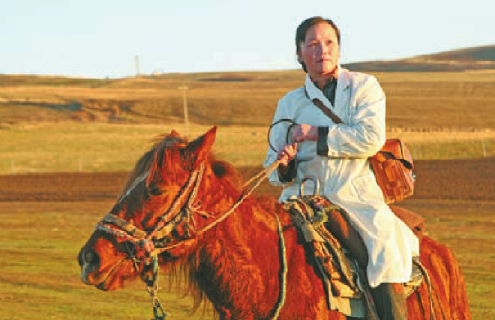
Mei Lian rides to visit a patient on the grasslands.[CHINA DAILY]
In the Kazakh language, baerluke means abundant, rich and having all that's needed.
However, nomads herding cattle on Baerluke Mountain-located on the Chinese border with Kazakhstan in the Xinjiang Uygur autonomous region-have always lived with a shortage of doctors.
"Baerluke needs me," says Mei Lian, a doctor who has worked for more than 20 years in this region.
Because of her exemplary work in the past two decades, the 47-year-old woman was promoted to deputy director of a regiment hospital under the Xinjiang Production and Construction Corps in nearby Yumin county in 2012. However, she never forgets her patients in the mountains, and insists on regularly visiting the herdsmen scattered in this area.
"I am a doctor and my duty is to save lives. This will never change," Mei says firmly.
Mei's parents came with the 161 Regiment of the Ninth Agricultural Division of the Xinjiang Production and Construction Corps to Baerluke area in 1962, and Mei was born in 1967.
Because of the harsh environment and the lack of medical support, Mei's little brother died of measles at the age of 3. He took his last breath on the road to the nearest hospital-50 kilometers away from their home.
There were several kids in Mei's neighborhood who died because they could not get timely medical treatment. These painful memories made Mei determined to become a doctor.
Mei taught herself by reading medical books, and then enrolled in correspondence courses of traditional Chinese medicine.
"To be frank, there were also some selfish motives," recalls Mei. "The workload was very heavy for both men and women in the Production and Construction Corps, and I thought the work for medical workers might be lighter."
After devoting all her spare time to absorbing medical knowledge, Mei finally became an assistant nurse at the clinic of the company in 1987.
At first, Mei was assigned to the 13th company of the local regiment. There were about 20 families of Kazakh herdsmen scattered around.
Because of bad road conditions, horseback was the main transport option. Wherever someone fell ill, Mei often had to ride for hours to see the patient in the mountainous area.
"I was not good at riding and sometimes I fell off the horse's back. But I didn't give up because I knew patients were waiting for me."
Mei's hard work earned her a good reputation among workers of the corps and local herdsmen. Over the past 20 years, Mei has treated several thousand patients, and whenever patients have difficulty paying the medical fees, she always lends them the money.
"I have become used to people knocking at Mei's door, asking her to see patients at midnight," says Mei's neighbor Wen Shu'e. "Despite bad weather or remoteness, Mei always sets off immediately for them."
As the deputy director at the regiment hospital since 2012, Mei no longer needs to ride a horse to see patients every day, but there are new problems.
"We have modern medical equipment in the hospital, but few doctors can use it," Mei says, sighing. "We can't even perform surgical operations."
Due to the tough living environment and comparatively low salary, young doctors are not willing to live and work there.
"We are badly in need of doctors," says Mei. "Every year we train new doctors, but every year many choose to leave. This is the biggest problem right now."
But Mei won't give up. She tried to increase the subsidies for overtime work for doctors and nurses from 12 yuan (about $2) per day to 35 and 30 yuan respectively.
"This will help them increase income by 500 to 600 yuan every month."
Mei hopes this will keep some of the young doctors from leaving.
Zhou Mengmeng, 24, a graduate from a medical college in Shandong, started working in Mei's hospital last August.
"People are simple and honest here. We have a good chance to practice, and Mei has set a good example for us."
After doing administrative work for two years in the regiment hospital, Mei plans to open clinic hours herself at least one day a week. She thinks that will keep improving her medical skills and will help her learn the real problems of the people. In her heart, she would rather be seeing to patients than to paperwork.
"Right now, my position asks me to bring up a team," says Mei. "Baerluke needs me, and I won't retire before I form a qualified medical team for the people here."
Xing Yi contributed to this story.
We Recommend:
